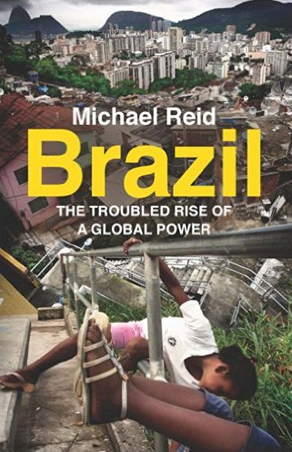
Book review: Brazil: The Troubled Rise of a Global Power, by Michael Reid. Yale University Press, 2014. 352 pages, $18.53 (kindle, amazon.com)

http://onlinelibrary.wiley.com/doi/10.1111/laps.12015/full
Volume 59, Issue 1
Spring 2017
Pages 154–174
Published:1 February 2017
DOI: 10.1111/laps.12015
After 2014, when Brazil organized the Football World Cup, the country will yet again receive millions of tourists from all over the world this year for the Olympic Games in Rio de Janeiro. What should those coming to Brazil for the first time, willing to go beyond what the Lonely Planet Brazil‘s History Section provides, read?
Over the past years, several scholars and correspondents have written short introductory, non-academic books on Brazil. Riordan Roett’s The New Brazil (reviewed here) offers a very broad overview, but feels like a lengthy Wikipedia entry without much interpretation. Larry Rohter’s Brazil on the Rise (reviewed here) is more engaging, but it does not include Brazil’s recent troubles, having been published in 2012. Michael Reid’s Brazil: The Troubled Rise of a Global Power, is perhaps their best choice, providing a lively, well-researched and balanced picture of Brazil. (The list of academic books focusing on specific aspects such as history or politics is far wider, including Levine’s The Brazil Reader, Boris Fausto’s A Concise History of Brazil, or, for those who are interested in Brazilian democracy, Alfred Montero’s Brazil: Reversal of Fortune.)
Reid moves briskly through Brazil’s history since the 16th century, but smartly connects historical events to contemporary culture and politics, explaining the origin of idioms and phrases commonly used in Brazilian Portuguese, thus providing some insights into a society largely opaque to non-Portuguese speakers. The author also does a very good job explaining the intricacies and dynamics of Brazil’s peculiar political system of “coalitional presidentialism”, which both Fernando Henrique Cardoso and Lula mastered so well, and which Dilma Rousseff failed to grasp.
Even though Reid’s book was published at a time when the depth of Brazil’s current economic crisis was not yet apparent, his historical analysis emphasizes the recurring pattern of boom, confidence, public overspending, and bust, often with profound political impacts. The author’s discussion of Brazil’s developmentalist tradition is particularly interesting. Reid acknowledges that by the 1980s, Brazil had the largest and most sophisticated industrial base in the developing world. Yet he also blames excessive state capitalism and a constant disregard for balancing the books for the ills (such as inflation) that have ultimately cemented the country’s grotesque inequality. Reid also points out that the government’s massive subsidies have ultimately benefited a tiny elite, without clear evidence that such interventionist activities helped the poor. Between 1974 and 1987, BNDES loans embodied a subsidy of $3.2 billion, of which the industrialists ended up paying back only 26% — a strategy he calls unfair, “entrenching privileges and inequalities”. Given BNDES’ key role in Brazil’s economic policy over the past years, this indeed deserves a broad debate. In the same way, Reid is right to point out that Brazil’s social spending reinforces, rather than weakens, inequality (e.g. by providing excessive pensions on relatively young retirees) — an issue that puts the PT in particular, in a bind, as it seeks to represent both the poor and the unions.
Reid argues that while the Brazilian government reacted correctly to the financial crisis of 2008 and increased public spending, the desire to assure his successor’s victory led Lula to destabilize public finance, a practice continued by Dilma Rousseff, who placed far too much confidence in the state’s capacity to enhance economic growth.
The book’s chapter on Brazil’s foreign policy is largely Western-centric and brushes off Lula’s attempts to strengthen ties to other powers in the Global South. The BRICS grouping is mentioned fleetingly, but Reid dismisses it as an ephemeral phenomenon. He dedicates most of his analysis to Brasília’s ties to the United States, even though China has long turned into Brazil’s most important trading partner. It is the only part of the book that feels somewhat one-sided. One section is titled “in search of a foreign policy”, implicitly conjuring up the image of a rudderless Brazil unsure of its role in the world.
As is inevitable when compressing an analysis of a continent-shaped country’s history and culture into one book, Reid simplifies often, in some cases omitting details or distorting reality. He says Brazil’s Carnival is “fabulously democratic” where “black and white mingle on equal terms”. Yet anybody who joins the Carnival celebrations in Salvador will not be reminded of racial democracy, but of apartheid South Africa, as ropes separate the poorer black population from middle- and upper class whites who pay to be able to celebrate in protected areas. In the same way, Reid’s affirmation that “Brazilians are generally sexually tolerant” may apply to upper-class neighborhoods in São Paulo, Brasília and Rio de Janeiro, but hardly to the rest of the country — as the country’s ultraconservative Congress attests.
As one advances through the chapters, it becomes apparent that for many general laymen, the book is perhaps too detailed and too long. Reid’s chapters on issues such as education, agriculture and state capitalism are impeccable and remarkably comprehensive, but they are very dense and could be used in an undergraduate class on Brazilian society. That makes the book somewhat of a hybrid, and it is not entirely clear if it is aimed at a general audience or meant to be a textbook.
Still, Reid’s account of what the Financial Times called “the world’s most exciting country” is balanced, accessible and an excellent place to start learning about the vibrant society that will host the 2016 Olympic Games. It is also recommended for Brazilian readers, who can skip the history part and start with the excellent analysis of Fernando Henrique Cardoso’s government, and then read the chapters that follow.
Read also:
Book review: “Brazil on the Rise: The Story of a Country Transformed” by Larry Rohter
Book review: “The New Brazil” by Riordan Roett
Book review: “Africa, Partner of Atlantic Brazil” by José Flávio Sombra Saraiva








